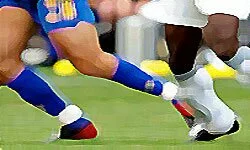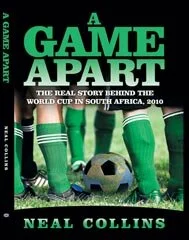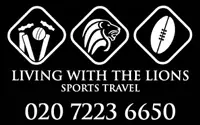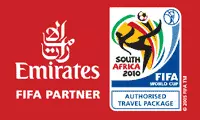Far from the shootings in Angola, this is South Africa
As news filters through about the Togo team bus which came under fire from Congolese rebels in Angola, I've just taken a call from Sky News. Like most European media, they will link this attack with the World Cup. I hope to put them straight later this evening.
Though the bus driver is hurt - possibly shot dead - the two Premier League players, Manchester City's Emmanuel Adebayor and Aston Villa's Mustapha Salifou are apparently "shaken but unhurt". It appears the Togo side may now withdraw from the African Nations Cup, which kicks off tomorrow. Togo were supposed to play Michael Essien's Ghana on Monday.
It's not good. This awful incident will have repercussions for the 2010 World Cup, inevitably, though Angola is a war-torn former Portuguese colony thousands of miles from where I am in Johannesburg, awaiting Thursday's decisive fourth cricket Test between England and South Africa.
Perhaps it's time to give my latest verdict on this country, thousands of miles from Cabinda, where yesterday's atrocity took place. I’ve been here a month now, yet another return to Africa. Since mid-December I’ve been covering the four-match Test series between England and South Africa. It’s been an incredible struggle on the cricket field.
But like all sport, what happens off the field is integral to the experience. I’ve been to Centurion, just outside Pretoria, Durban, Cape Town and now Johannesburg.
Four entirely different cities, these are the four major World Cup venues later in the year. I attended a game between the local Premier League champions Supersport United and rock-bottom Jomo Cosmos at Loftus Versfeld, the World Cup stadium in the South African administrative capital, Pretoria.
It’s where hosts South Africa will play Uruguay on June 16 and the USA take on Algeria on June 23, just two of the five qualifying games scheduled for the 50,000-capacity rugby stadium opened in 1903 and refurbished many times, the last in 2008.
I was one of the few white fans in evidence, but there was no sense of insecurity or differentness. An electrician called Reggie took me under his wing and gave me a run down on the state of local football. He even offered a tour of the townships and a trip to see the great Kaizer Chiefs. Afterwards, dressed in an England football jersey, I was hugged by the Supersport fans outside as they celebrated a 3-0 victory. “We’ll beat you at the World Cup,” they laughed, hopefully.
Outside the scenic Centurion cricket ground, the brand new Gautrain rail link flies on concrete stilts through the air over the motorways. Most of it will be open in time for the big kick-off on June 11. It is a major feat of modern engineering and a major drain on any nation's resources, costing billions.
And everywhere in Centurion, the rapidly growing metropolis north of Pretoria, there is an awareness the world is coming to town. What can I tell you? That the Velmore Estate, just outside the tiny suburb of Erasmia, will house Michael Ballack and the German team? Magnificent place. Google it. Remote, backing on to the tranquil Hennops River. Helpful staff showed my father and I around the spa, an oxygen chamber and luxury rooms, complex medical facilities – they’re even building a poolside beach.
In Centurion itself, the Italians will be at Leriba Lodge and the Americans will go to Irene Lodge, a mile away. Beautiful African venues with lakes and traditional thatch in evidence. Both will train at local high schools, where special pitches have been laid for the international onslaught of football studs training at altitude, preparing for a World Cup a different heights, but blissfully free of Apartheid.
In neighbouring Pretoria, Diego Maradona's Argentina will be based at the University's High Performance Centre, where the trans-sexual world athletics champion Caster Semenya was coaxed to stardom.
Then, in Muldersdrift, one step closer to Johannesburg, the Australians are staying at beautiful Kloofsicht in the middle of nowhere while the Dutch have chosen the centre of opulent Joburg suburb Sandton for their base, training at the Milpark Stadium, home of local side Wits.
And I even discovered the England training camp outside Rustenburg. Secret, luxurious, not complete until May. Built by the Bafokeng tribe, who earn a percentage from the numerous local platinum mines, the Bafokeng Sports Palace complex offers 17 grass pitches, five artificial surfaces, swimming pools and a magnificent low-slung hotel complex fit for a king. King Kagosi Leruo Molotgeti to be precise. The local monarch has been heavily involved in the project which will become the highest altitude training camp in the country.
The first British journalist to enter the facility, I finally found the burgeoning complex under construction behind a fading motel facade six kilometres along the road to Africa’s Las Vegas Sun City from the Bafokeng World Cup stadium in underdeveloped Phokeng (mind how you pronounce that).
Just by chance (the World Cup draw on December 4 last year was very kind to them!) England will open their campaign against the USA there on June 12 in front of a full-house 42,000 fans from the two best supported nations in South Africa. And they’ll be back for their first knock-out game in the same magnificent bowl if they win Group C. You can read more about this – and see exclusive photographs - on my website at nealcollins.co.uk.
Then on to the Boxing Day Test in Durban, another town undergoing huge World Cup construction. There I visited the magnificent new Moses Mabhida Stadium, which will host five qualifiers and a semi-final. A magnificent arched arena right next to the huge King’s Park rugby stadium, it will hold 70,000 and they are just finishing the construction of a fans’ walkway to nearby Battery Beach.
Already fans are able to take a cablecar over the arch and they are even planning to allow bungy jumping from the highest point. Incredible!
Durban is a vast, cosmopolitan port, shared by Europeans, Asians and Zulus. I walked to the beach from the luxurious Hilton Hotel a mile away and felt completely at home on the African seaside, body surfing in the huge rollers of the Indian Ocean, where once black people were banned from bathing.
New Year took us to Cape Town and another brand new stadium at Green Point. The scenery has to be seen to be believed. Nestled under Signal Hill next to the landmark Table Mountain, the parliamentary capital of South Africa is another cosmopolitan port, where all colours, all creeds, are now free to mingle.
My wife Tracy and I walked the main road – Long Street – at 2am on New Year’s night amid the revellers. And despite her alarmingly short evening dress, we only received hearty “Happy New Years” from the teeming masses. It was an evening that capped a very moving return to Africa.
And finally, as I write, I find myself in Johannesburg at the plush Wanderers Protea hotel. Two World Cup stadiums here. Ellis Park, the nation’s historic rugby stadium which can hold 62,000 after recent refurbishment. First used in 1926, the venue where South Africa won the nation-unifying Rugby World Cup in 1995 will host five qualifiers and a quarter-final.
Then, on the other side of the city near the fabled township of Soweto where the seeds of freedom were sown in 1976, we have Soccer City. A crowd of 94,700 will fill the Kalabash-shaped (cauldron-shaped) stadium for the opening game of the World Cup between the hosts and Mexico. It will also be the venue for the final on June 11. What a day that promises to be.
Johannesburg is the most troubled of South Africa’s cities. It’s always been a fascinating hotchpotch, since the Witwatersrand gold rush of the 19th century brought fortune hunters from around the world to the heart of Africa.
Today it is a bustling metropolis, the biggest city in South Africa and still the commercial capital, where it all happens, where the stock exchange keeps this nation ahead of the rest of the continent economically.
There is a third-world fear of crime in the streets here, but only in certain areas, like any major city. I suggest caution, but no need for rampant paranoia.
For four weeks, with thousands of English “Barmy Army” cricket fans, we have traversed the nation, discovering new gems, shrugging off the xenophobia of the European media which suggests we must always be on our guard in post-Apartheid South Africa.
And everywhere the changes wrought in 16 years of democracy are evident. Find me a nation which has developed more than this one since 1993. The 35-mile stretch between Pretoria and Johannesburg has mushroomed beyond belief.
Once there were miles of empty bushveld between the cities. Now Centurion, Midrand and Sandton are joined by thousands of middle class homes, shopping malls and retail outlets. This is boom time, even in a recession.
Rustenburg has grown beyond recognition, as have three further World Cup cities, Port Elizabeth, Nelspruit and Polokwane. Game Parks abound. When the nation changed there were around 60 safari parks. Now there are over 6,000. Take time when you visit, make sure you take a dawn or dusk game drive. You’ll never forget it.
Durban has rebuilt the once-troubled Point Road area south of the city, creating an African paradise called Ushaka, all restaurants, aquariums and shops. At one venue, built in a ship wreck, you eat lobster watched by sharks in a two-storey high glass tank at your elbow.
Up the north coast, tiny villages like Umdhloti and Ballito have become major resorts. Umhlanga offers the biggest shopping centre in the southern hemisphere.
And they’ve got the new runway near La Mercy opening in March, so two airports will ferry the thousands of football fans into the city, from the industrial south and the sugar-cane festooned north.
And in Cape Town, the jewel at the tip of Africa, growth along the waterfront, where former prisoners host boat trips to Nelson Mandela's now-defunct political jail on Robben Island, continues unfettered by the global economic downturn.
In one day, we saw the seals at Hout Bay, the penguins at Boulder Beach and baboons at Cape Point where the Atlantic and Indian Oceans meet. We travelled by cable car up the mountain, by funicular railway to the Cape Point lighthouse, by coach around the magnificent Chapman's Peak.
I’ve already been on 702 radio here talking about the upcoming tournament, Africa’s first World Cup. Explaining that so much of what the Rainbow Nation has achieved since 1993 should be considered nearly miraculous. This is the start of my World Cup crusade.
Surprisingly, there is positive feedback - even from the staunch Afrikaners, who had their hard-won political power torn away by the surprise Nelson Mandela/FW De Klerk double act in the early 1990s.
For over 40 years, Apartheid was shoved down the throats of every young white man in South Africa. We are the master race, they were told, at school and in church, at home and at work.
For over 40 years, the indigenous folk were told they were the foreigners here, second class citizens in their own land, at school and in church, at home and at work.
But South Africa today is the Rainbow Nation. A black middle class has emerged from nowhere. Articulate Africans abound, defying years of poorly funded “Bantu Education”. Black and white eat together, worship together, live together. It seems like yesterday they couldn’t even share a bench together.
Over the last month, thousands of English cricket fans and international tourists will have seen what I have witnessed. An African nation emerging as a world force, a colour blind Rainbow Nation capable of miracles.
And soon the world will see it. Every television, every newspaper will focus on Africa’s first World Cup from June 11 to July 11. And I hope they see what we’ve seen.
Labels: Emmanuel Adebayor, England in Rustenburg, Moustapha Salifou, shooting in Angola, south african world cup 2010








